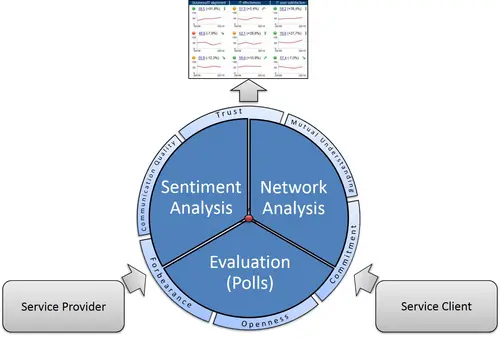Controlling the Social Aspects of Relationship Quality
Building and sustaining high-quality relationships between contractors is one of the key challenges in sourcing arrangements (IT, BPO, shared service organization, etc.) and often the source of failure. While most technical issues, like service quality, can be largely controlled in a straightforward and often automated way, things get much more complex when considering the social/soft factors which determine how effectively and efficiently the involved parties collaborate with each other in terms of communication quality, trust, and mutual understanding. Thus, sourcing arrangements are nowadays often controlled in an imbalanced way: while the sourcing management (e.g., the retained organization) focuses too strongly on aspects that can be easily measured (KPIs, fulfillment of SLAs etc.), capturing the real essence of a relationship is often rather neglected and, moreover, becomes manifest not only by the relationship between the client’s IT and the vendor but is strongly determined by the client’s business side (the actual receiver of the services delivered). Accordingly, controlling a sourcing relationship in a holistic way requires the monitoring of soft relationship aspects along this triangle. Thus, indications about potential problems can be observed at early stages.

The key objective of the “(Out-)Sourcing Relationship Tracker” project, which will be conducted in cooperation between pliXos and the University of Bamberg, is to overcome existing constraints in ongoing relationship quality measurement and develop an innovative SaaS-based relationship monitoring tool that collects data semi-automatically from different sources and provide sound and up-to-date online reporting on the current status of relationship quality in sourcing arrangements.
Outsourcing engagements between IT vendors from Eastern Europe and their Western European clients account for large parts of the European outsourcing market. These “nearshoring” scenarios often differ from arrangements with “traditional” offshoring providers from, for example, India. However, research on particular success factors for effectively managing these nearshoring relationships is sparse, although being highly important for both vendor and client side success.
The tracker offers two novelties compared to existing solutions. First, the system will focus on success factors and attributes of relationship quality, such as communication quality, trust, openness, and mutual understanding, rather than focusing on performance indicators (like service quality) or formal capabilities, like control, governance etc. Second, we are researching the applicability of different novel methodologies like automated social network analysis (analysis of communication patterns) or sentiment analysis (automated analysis of message contents) that help measure relationship quality between vendor and client without using too many surveys or polls among the team members. These methodologies will minimize manual data collection efforts and could make relationship quality measurement as transparent and efficient as the measurement of the “traditional” (objective) key performance indicators.
